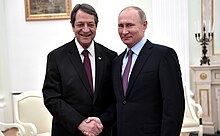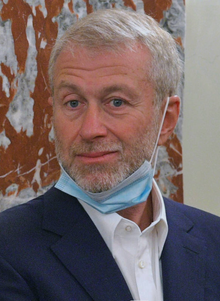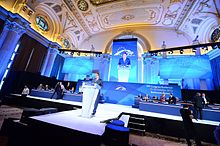Nicos Anastasiades
This required the island to generally cut public spending, though his administration remediated this by attracting significant foreign investment and then increasing the minimum wage, improving the economy.
Anastasiades signed several agreements to promote closer economic and financial ties with Moscow, turning Cyprus into a vehicle for Russian oligarchs to register their assets there and avoid international sanctions implemented since 2014.
[citation needed] In 2013, upon assuming office, Anastasiades inherited a critical economic crisis triggered by a combination of factors, including a persistent budget deficit, an outgrown and problematic banking sector representing 750 percent of GDP in 2010, and the fallout from a property boom.
[17] Collaborating with the European Union and the International Monetary Fund, Anastasiades finalized a crucial bailout agreement in Brussels to prevent the bankruptcy of Cyprus' main banks and avoid a potential euro exit.
[26] On 9 January 2015, Cyprus Airways, the island's flag carrier with 67 years of history, faced a sudden closure following a European Commission ruling that declared the airline's receipt of €100 million in state aid, provided during the Demetris Christofias' government, as illegal.
President Nicos Anastasiades played a pivotal role in managing the aftermath, expressing regret over the airline's closure and taking steps to address the concerns of the 560 dismissed employees.
The airline aims to facilitate year-round connectivity, focusing on core markets and serving as a point-to-point carrier, with plans to double its Airbus A220 fleet in early 2024 to support expansion.
[43] He pledged to implement the Structural Reforms demanded by the European Commission in order to obtain economic aid and cut social benefits, pensions and wages in the public and private sectors, while increasing VAT and fuel taxes.
[50] The start of peace negotiations between Anastasiades and his Turkish Cypriot counterpart began in October 2013, attracting the interest of international media and world leaders including Barack Obama.
[51] In November 2016, negotiations for a comprehensive agreement on the Cyprus issue took place between Anastasiades and Turkish Cypriot leader Mustafa Akıncı at the Mont Pèlerin resort in Switzerland, under the auspices of the United Nations.
[54] The Crans-Montana talks, which unfolded in a Swiss mountaintop resort in the summer of 2017, between Anastasiades and Turkish Cypriot leader Mustafa Akıncı (as well as Greece, Turkey, the U.K., the United Nations, and the European Union) negotiated the reunification of Cyprus.
The security and guarantees aspect aimed to replace the right of intervention with mutually agreed-upon monitoring mechanisms and outlined the gradual reduction of existing troops, with troop-related matters to be discussed at the highest level when appropriate.
[70] On 2 January 2020, Anastasiades’ government signed a deal with Greece and Israel to construct a 1,900 km subsea pipeline, known as the EastMed project, to transport natural gas from the Eastern Mediterranean to Europe.
In a meeting during the Belt and Road Forum in Beijing, Putin noted a 154% increase in commerce with Cyprus, while Anastasiades expressed gratitude for Russia's longstanding political, economic, and military support.
In response, Anastasiades stated that Russia's violation of international law forced Cyprus to align with the European Union's collective decisions against Moscow, leaving his government with no choice but to participate in EU sanctions.
The tourism sector, heavily reliant on Russian visitors, was threatened, and Limassol implemented a "de-Russianisation doctrine," with a shifting in mindset, emphasising service-oriented industries over large-scale manufacturing.
[96][97] The U.S.A directed Anastasiades’ administration to address the issue of Russian individuals and their questionable deposits, and, in return, the U.S. lifted the arms sales embargo to Cyprus; as a result, American marines and warships participated in joint exercises with the Cypriot National Guard in the port of Limassol.
[98] Despite ostensible attempts by Anastasiades' government to disassociate from Putin's regime, the "Cyprus Confidential" investigation exposed undisclosed and contentious Cyprus-Russian relations that endured post the 2022 Russian invasion of Ukraine.
The leaked 3.6 million documents implicate six billionaires, including Roman Abramovich, while former President Nikos Anastasiades is depicted as supporting Russian interests amid international sanctions, prompting inquiries into alleged money laundering activities.
Secretary-General of the Gulf Cooperation Council, Abdul Latif Bin Rashid Al Zayani, acknowledged the deepening ties between Saudi Arabia and Cyprus under Anastasiades' leadership.
[115][116] Anastasiades' government implemented a new two-week partial lockdown from 26 April to 9 May 2021, coinciding with the Orthodox Easter holidays, as the country grappled with a third wave of COVID-19 cases, primarily fuelled by a new, more contagious British variant.
Citizens in Cyprus, when visiting crowded places, were required to present evidence of COVID-19 immunity (vaccination certificate with at least one dose or proof of COVID-19 contraction in the last 6 months), or a negative rapid test result valid for 72 hours.
Mask requirements in indoor spaces were eliminated, and travelers arriving in Cyprus were no longer obligated to present a vaccination certificate, recovery proof, or negative PCR or rapid test.
Then transport Minister Yiannis Karousos emphasised that this move signified a return to normality in travel, with flight capacity reaching high levels and passenger traffic approaching pre-pandemic figures.
Following this, on 31 March 2020, the Cypriot cabinet approved additional measures to address overcrowding, including early releases, transfers to the open prison, and electronic home monitoring.
Then Greek Cypriot Health Minister Constantinos Ioannou insisted the closures were not political, citing a shortage of medical personnel monitoring the crossings, while the UN expressed concern and called for coordinated efforts to address the situation.
[139] Despite unprecedented protests and heavy criticism, Anastasiades' COVID-19 campaign has emerged as a success story, securing the fifth position in the global COVID Performance Index of 98 nations by the Sydney-based Lowy Institute.
The Aspen Trust Group highlights the key factors that contributed to Cyprus's success, emphasising the amalgamation of stability and adaptability within business, governmental regulations, and lifestyle influences.
The nation's success in maintaining growth indicators and its ability to navigate the crisis through diversification and modernization of the marketplace further solidify Cyprus's standing as a resilient business hub amidst the pandemic.
[8] Makarios Drousiotis, a political activist, journalist, and writer, published a trilogy of books containing personal accounts and third-party documents uncovering extensive corruption scandals during the presidency of Nicos Anastasiades.

















